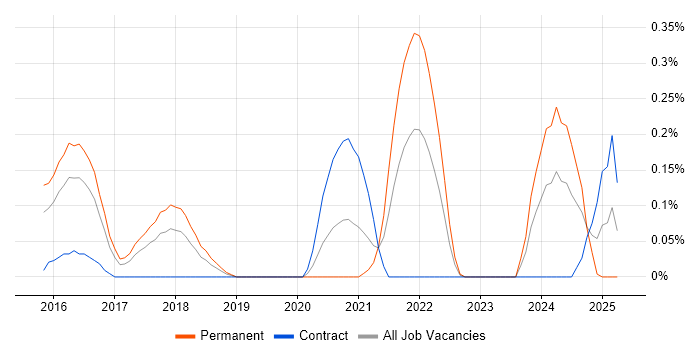Kali Linux
Berkshire > Reading
The table below provides summary statistics for permanent job vacancies advertised in Reading requiring Kali Linux skills. It includes a benchmarking guide to the annual salaries offered in vacancies that cited Kali Linux over the 6 months leading up to 13 May 2025, comparing them to the same period in the previous two years.
| 6 months to 13 May 2025 |
Same period 2024 | Same period 2023 | |
|---|---|---|---|
| Rank | - | 113 | - |
| Rank change year-on-year | - | - | - |
| Permanent jobs citing Kali Linux | 0 | 5 | 0 |
| As % of all permanent jobs advertised in Reading | - | 0.29% | - |
| As % of the Operating Systems category | - | 1.62% | - |
| Number of salaries quoted | 0 | 1 | 0 |
| Median annual salary (50th Percentile) | - | £120,000 | - |
| Berkshire median annual salary | - | £120,000 | - |
All Operating Systems
Reading
Kali Linux falls under the Operating Systems category. For comparison with the information above, the following table provides summary statistics for all permanent job vacancies requiring operating system skills in Reading.
| Permanent vacancies with a requirement for operating system skills | 88 | 309 | 326 |
| As % of all permanent jobs advertised in Reading | 17.15% | 18.03% | 20.52% |
| Number of salaries quoted | 64 | 234 | 172 |
| 10th Percentile | £34,000 | £26,000 | £23,550 |
| 25th Percentile | £36,250 | £34,000 | £31,250 |
| Median annual salary (50th Percentile) | £45,000 | £51,350 | £50,000 |
| Median % change year-on-year | -12.37% | +2.70% | -16.67% |
| 75th Percentile | £47,813 | £59,000 | £73,875 |
| 90th Percentile | £60,283 | £75,000 | £85,000 |
| Berkshire median annual salary | £45,000 | £50,000 | £49,175 |
| % change year-on-year | -10.00% | +1.68% | -10.59% |
Kali Linux
Job Vacancy Trend in Reading
Job postings citing Kali Linux as a proportion of all IT jobs advertised in Reading.

Kali Linux
Salary Trend in Reading
3-month moving average salary quoted in jobs citing Kali Linux in Reading.
